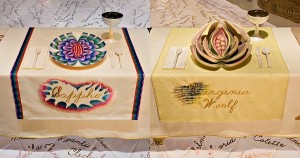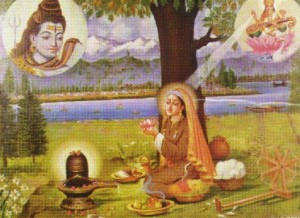
Writers are often asked where they get their ideas, and that’s a good damn question. As far as I can tell, memory, imagination, dreams, bits of history, overheard conversations, observations, and popular culture combine in unpredictable ways to fuel a story. The past is always awake telling us where we’ve been and what we’ve known. The future alights in reverie or dreams, at the blurred edges of our vision, offering glimpses of what might be possible. Imagination bundles up rag-tags of this and that and pushes them into consciousness where a whole new thing takes form. None of this is analyzed by the writer, certainly not this writer: when the muse arrives with a full suitcase, I welcome her like a queen.
But here’s my latest answer to that perennial question of where a writer’s ideas come from — they come from the brilliant minds of others! On that note, when recently asked by a friend what writers I’d invite to a dinner party, the following list popped into my head. And what a list! Can you imagine what a vibrant, eclectic, and profound conversation might ensue?
 Sappho
SapphoJane Goodall
Virginia Woolf
Lalleshwari
Muriel Spark
Marie-Louise von Franz
Toni Morrison
All women — at least this time around.
Two poets. Three novelists. One primatologist/anthropologist. One Jungian archetypal psychologist.
One Greek. Two Brits. One Scot. One Kashmiri. One Swiss. One American.
It would take pages and pages to adequately praise the work of each of these brilliant women, but one thing they have in common is their uncommon courage as writers and thinkers. Each has changed the way I see and think about the world, each has astonishing stories to tell.
 The fourteenth-century mystic poet Lalleshwari, also known as Lal Ded, lived at a time when Shaivism, Sufism, Buddhism, and Hinduism were alive and entwined in a rich amalgam of religions merging in Asia. I’m told that though she was ridiculed and taunted, Lalla, lit by divine inspiration, danced naked through the Kashmiri valley singing her ecstatic poems. Here is her voice, translated by Coleman Barks.
The fourteenth-century mystic poet Lalleshwari, also known as Lal Ded, lived at a time when Shaivism, Sufism, Buddhism, and Hinduism were alive and entwined in a rich amalgam of religions merging in Asia. I’m told that though she was ridiculed and taunted, Lalla, lit by divine inspiration, danced naked through the Kashmiri valley singing her ecstatic poems. Here is her voice, translated by Coleman Barks.
I didn’t trust it for a moment,
but I drank it anyway,
the wine of my own poetry.
It gave me the daring to take hold
of the darkness and tear it down
and cut it into little pieces.
Jane Goodall. I reach for one of her books when I need to remind myself to honor my instincts and rekindle my sense of wonder. When doubt (something I’m examining a lot these days) blunts my energy for taking a step forward, I reach for Jane — a role model for me of a writer who has documented the courage and passion necessary for her work.
 Among other esteemed achievements, Jane Goodall is credited with changing how scientists study animals in their natural habitats. In 1960, without any formal training or advanced education, she left England to study wild chimpanzees at the Gombe project in Tanzania under the tutelage of the famous anthropologist, Louis Leakey. In her own words, she was then “a naïve young English girl,” but one who’d always held a fascination with wild life. Now, decades and many books later, she’s an international treasure. Here’s one of my favorite passages from her book Through a Window.
Among other esteemed achievements, Jane Goodall is credited with changing how scientists study animals in their natural habitats. In 1960, without any formal training or advanced education, she left England to study wild chimpanzees at the Gombe project in Tanzania under the tutelage of the famous anthropologist, Louis Leakey. In her own words, she was then “a naïve young English girl,” but one who’d always held a fascination with wild life. Now, decades and many books later, she’s an international treasure. Here’s one of my favorite passages from her book Through a Window.
There are many windows through which we can look out into the world, searching for meaning. There are those opened up by science, their panes polished by a succession of brilliant, penetrating minds. Through these we can see ever further, ever more clearly, into areas that once lay beyond human knowledge. Gazing through such a window I have, over the years, learned much about chimpanzee behavior and their place in the nature of things. And this in turn, has helped us to understand a little better some aspects of human behavior, our own place in nature.
But there are other windows; windows that have been unshuttered by the logic of philosophers; windows through which the mystics seek their visions of truth; windows from which the leaders of the great religions have peered as they search for purpose not only in the wondrous beauty of the world, but also in its darkness and ugliness. Most of us, when we ponder on the mystery of our existence, peer through but one of these windows onto the world. And even that one is often misted over by the breath of our finite humanity. We clear a tiny peephole and stare through. No wonder we are confused by the tiny fraction of a whole that we see. It is, after all, like trying to comprehend the panorama of the desert or the sea through a rolled-up newspaper.
 Marie-Louise von Franz is probably the least recognizable name on my list. Like her mentor and colleague, the depth psychologist Carl Jung, Ms. Von Franz can be credited with helping modern thinkers understand the psychological and symbolic dimension of fairy tales. At my imaginary dinner party, Marie-Louise turns first to Sappho and then to Toni Morrison and asks each their favorite fairy tale. Are you a Cinderella? Rapunzel? A bewitched crow? she might inquire. Can you imagine the lively conversation that would follow? Most of us are driven by the unconscious myths we carry about ourselves, and these motifs, these archetypes (the orphan, the seducer, the wise old man) with which we identify shape our lives. Think about it! What fairy tales haunt your mind?
Marie-Louise von Franz is probably the least recognizable name on my list. Like her mentor and colleague, the depth psychologist Carl Jung, Ms. Von Franz can be credited with helping modern thinkers understand the psychological and symbolic dimension of fairy tales. At my imaginary dinner party, Marie-Louise turns first to Sappho and then to Toni Morrison and asks each their favorite fairy tale. Are you a Cinderella? Rapunzel? A bewitched crow? she might inquire. Can you imagine the lively conversation that would follow? Most of us are driven by the unconscious myths we carry about ourselves, and these motifs, these archetypes (the orphan, the seducer, the wise old man) with which we identify shape our lives. Think about it! What fairy tales haunt your mind?
Space prevents me from quoting more than two writers who’ve inspired me to speak the truth and given me faith in my own process. But to circle back to my specific choices, I see now that these invited guests share certain qualities that in turn reflect my own biases and interests. They are observers, rebels, pioneers, seekers, original thinkers, and I think also, each is in her own way, sassy and determined.
May you too find nourishment in their books, and may you too be awakened to new wonders. Here’s a place to start.
Sappho Sappho: a new translation Mary Barnard
Jane Goodall Through A Window
Virginia Woolf Moments of Being
Lalla Naked Song, translated by Coleman Barks
Toni Morrison Beloved
Marie-Louis von Franz Shadow and Evil in Fairytales
Muriel Spark The Prime of Miss Jean Brodie
